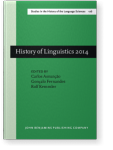L’interjection dans la tradition grammaticale latine, de l’Antiquité à l’Humanisme
This article examines the treatment of the interjection in the Latin grammatical tradition, from Varro to the 17th Century. The author focuses on the originality and specificity of this part of speech from different points of view: the etymology of the word ‘interiectio’ and its exploitation by grammarians; the coining of a specific term and the recognition of a subspecies within a word class; the definition of interiectio and its semiotic, phonological and syntactic functions. The interjection has a paradoxical status among Latin grammarians: lacking the status of a (full) word, and not being clearly structured, the interjection is often equivalent to an entire sentence, and is at times pragmatically more ‘efficient’ than a sentence.
Article language: French
